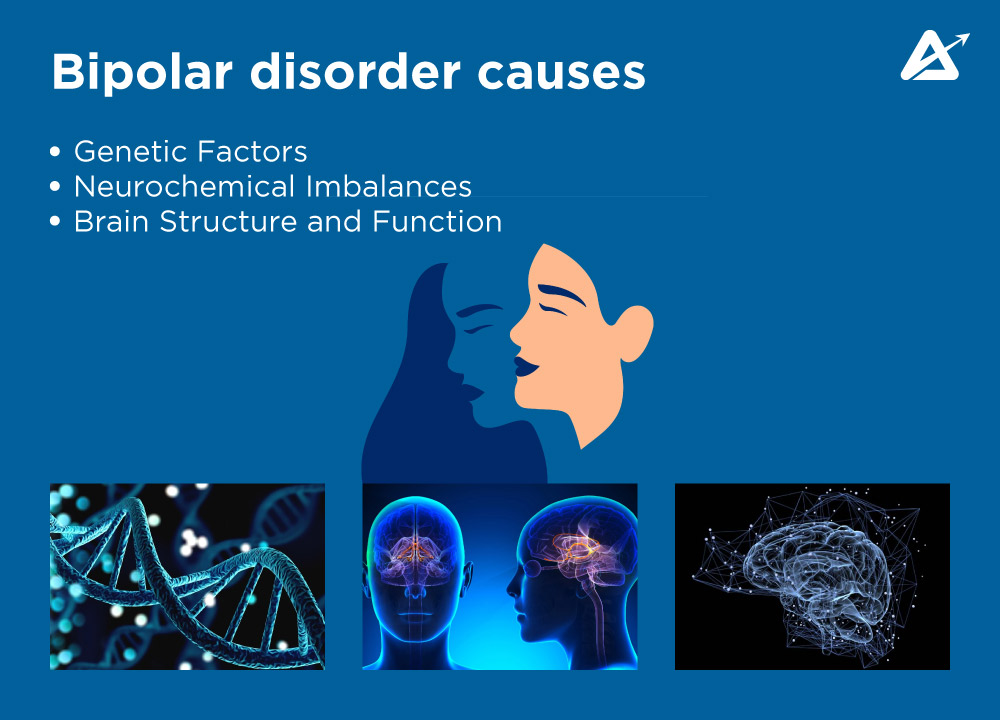Hy, Does Tough Love Work with Bipolar readers, When it comes to supporting individuals with bipolar disorder, finding the right approach can be challenging. Bipolar disorder is a complex mental health condition characterized by extreme mood swings, ranging from manic highs to depressive lows. While tough love may seem like a straightforward approach to motivating change. It’s essential to consider the unique challenges and needs of individuals living with bipolar disorder.
In this blog, we will explore the effectiveness of tough love in managing bipolar disorder. And discuss alternative strategies that prioritize understanding, empathy, and support.
Understanding Bipolar Disorder
Before delving into the concept of tough love, it’s crucial to develop a basic understanding of bipolar disorder. Bipolar disorder is a chronic condition that affects a person’s mood, energy levels, and ability to function. It is often marked by periods of intense mania, during which individuals may experience heightened energy, euphoria, and impulsivity. These manic episodes are typically followed by periods of depression, characterized by profound sadness, low energy, and a lack of interest or pleasure in activities.
What is Bipolar Disorder?
Bipolar disorder, also known as manic-depressive illness. It is a mental health condition characterized by extreme shifts in mood, energy levels, and activity levels. Individuals with bipolar disorder experience episodes of mania, characterized by elevated or irritable mood, increased energy, impulsivity, and a heightened sense of self-confidence. These manic episodes are often followed by periods of depression, during which the person experiences persistent feelings of sadness, hopelessness, low energy, and a loss of interest in previously enjoyable activities.
The disorder can significantly impact a person’s daily functioning, relationships, and overall quality of life. Bipolar disorder can vary in severity and may require long-term management through a combination of medication, therapy, and lifestyle adjustments. It is important for individuals with bipolar disorder to receive a proper diagnosis and ongoing support from mental health professionals to effectively manage their symptoms and promote stability in their lives.
Symptoms
- Cycles of extreme mood swings between manic episodes and depressive episodes.
- Manic symptoms may include elevated mood, increased energy, impulsivity, racing thoughts, and decreased need for sleep
- Depressive symptoms may include sadness, loss of interest, fatigue, changes in appetite and sleep patterns, difficulty concentrating, and thoughts of death or suicide
- Rapid shifts in mood and behavior
- Irritability and agitation during manic episodes
- Feelings of guilt, worthlessness, or hopelessness during depressive episodes
- Difficulty in maintaining relationships and fulfilling responsibilities
- Poor decision-making and engaging in risky behaviors during manic episodes
- Changes in appetite and weight
- Cognitive impairments, such as difficulty with memory and concentration
- Suicidal thoughts or attempts in severe cases
- Impact on daily functioning and overall quality of life
Causes

- Genetic Factors: Bipolar disorder tends to run in families, suggesting a genetic component. Individuals with a family history of the disorder are at a higher risk of developing it themselves. However, specific genes or genetic mutations linked directly to bipolar disorder have not been identified conclusively.
- Neurochemical Imbalances: Neurotransmitters, such as serotonin, norepinephrine, and dopamine, play a crucial role in regulating mood and emotions. It is believed that imbalances in these neurotransmitters can contribute to the development of bipolar disorder. However, the exact mechanisms are still being researched.
- Brain Structure and Function: Structural and functional differences in the brain have been observed in individuals with bipolar disorder. These differences primarily involve areas responsible for emotional processing, mood regulation, and decision-making. The impact of these brain changes on the development of bipolar disorder is still being studied.
- Environmental Factors: Certain environmental factors can trigger or exacerbate bipolar disorder symptoms in susceptible individuals. These factors include stressful life events, significant life changes, trauma, substance abuse, and disruptions in sleep patterns. They do not cause bipolar disorder directly, but they can influence the onset and severity of symptoms.
- Hormonal Imbalances: Hormonal imbalances, particularly in the endocrine system, have been suggested as potential contributors to bipolar disorder. Fluctuations in hormones such as cortisol, thyroid hormones, and estrogen may influence mood regulation. However, more research is needed to understand the exact relationship between hormones and bipolar disorder.
It’s important to note that while these factors are associated with bipolar disorder, the exact cause of the condition remains unclear. Bipolar disorder is a complex interplay of various factors, and each person’s experience with the disorder may differ.
The Concept of Tough Love
Tough love is an approach that involves setting strict boundaries and consequences to motivate change in a person’s behavior, often associated with addiction or harmful habits. It can involve withholding support, applying pressure, or allowing individuals to face the consequences of their actions. While it may be effective in some situations, it requires careful consideration when applied to bipolar disorder due to its complex nature.
The Challenges of Applying Tough Love to Bipolar Disorder
The volatility of moods: Bipolar disorder involves unpredictable shifts between extreme highs and lows. During manic episodes, individuals may not respond well to tough love as they may exhibit impulsive or irrational behaviors. Applying strict boundaries during depressive episodes can exacerbate feelings of isolation and hopelessness.
Emotional vulnerability: People with bipolar disorder are often emotionally vulnerable and can experience intense emotions. Tough love may heighten feelings of rejection and intensify negative emotions, potentially triggering further instability.
Risk of self-destructive behavior: In severe cases, individuals with bipolar disorder may engage in self-harming behaviors or exhibit suicidal tendencies. Applying tough love without a supportive framework can inadvertently worsen their mental state and increase the risk of harm.
Alternative Approaches

Education and understanding: Educating oneself and others about bipolar disorder can foster empathy and compassion. Understanding the condition’s challenges can help family members and friends provide appropriate support without resorting to tough love.
Establishing healthy boundaries: While tough love may not be suitable for bipolar disorder, setting healthy boundaries is essential. Encouraging open communication, expressing concerns, and establishing limits in a supportive manner can promote stability and self-care.
Encouraging professional help: Encourage individuals with bipolar disorder to seek professional help, such as therapy or medication management. These interventions can provide the necessary support and guidance in managing symptoms and promoting overall well-being.
Building a support network: Surrounding individuals with bipolar disorder with a strong support network can make a significant difference. Connecting with support groups or organizations can provide opportunities for individuals to share experiences and receive encouragement from others who understand their challenges.
The Role of Tough Love in Bipolar Treatment
Tough love can play a significant role in the treatment of bipolar disorder, a mental health condition characterized by extreme mood swings. While love and support are vital, tough love provides a unique approach that balances empathy with accountability, promoting the overall well-being of individuals with bipolar disorder.
In bipolar treatment, tough love involves setting boundaries and holding the person accountable for their actions and behaviors. It encourages individuals to take responsibility for their choices and work towards managing their condition effectively. Tough love can include interventions such as enforcing medication compliance, encouraging therapy attendance, and fostering healthy lifestyle habits.
By implementing tough love, caregivers and loved ones aim to prevent enabling behaviors that can inadvertently perpetuate the negative consequences of bipolar disorder. It helps break the cycle of dependence and encourages individuals to develop resilience, self-discipline, and personal growth.
However, it is important to exercise tough love with empathy and compassion. Understanding the challenges faced by someone with bipolar disorder is crucial to avoid being overly harsh or judgmental. Creating a supportive environment where open communication is encouraged can help strike a balance between tough love and emotional support.
Ultimately, the role of tough love in bipolar treatment is to provide structure, guidance, and accountability while promoting the individual’s long-term stability and well-being. When applied appropriately and in conjunction with professional medical and therapeutic interventions, tough love can be a valuable tool in helping individuals with bipolar disorder manage their condition and lead fulfilling lives.
Pros of Tough Love in Bipolar Disorder Management

Establishing boundaries: Tough love can help set clear boundaries and expectations for individuals with bipolar disorder. This can provide structure and stability, which are essential for managing the condition effectively.
Encouraging accountability: Tough love can promote personal responsibility and accountability for one’s actions. Holding individuals with bipolar disorder responsible for their behaviors and choices can motivate them to take ownership of their condition and actively engage in their treatment.
Fostering independence: Tough love can empower individuals with bipolar disorder to develop independence and self-reliance. It encourages them to develop coping strategies, problem-solving skills, and resilience, which are vital for the long-term management of their condition.
Cons of Tough Love in Bipolar Disorder Management
Increased stress: Tough love approaches may lead to heightened stress levels for both the individual with bipolar disorder and their loved ones. The strict boundaries and expectations may create tension and strain relationships, potentially exacerbating symptoms of the condition.
Emotional distancing: Tough love can inadvertently create emotional distance between the person with bipolar disorder and their support system. The emphasis on accountability and self-reliance may discourage open communication and hinder the formation of a strong support network.
Risk of exacerbating symptoms: Individuals with bipolar disorder are already vulnerable to mood swings and emotional instability. The strictness and rigidity of tough love may increase stress and trigger episodes, potentially worsening symptoms and disrupting the overall management of the disorder.
Is “tough love” an appropriate response for dealing with bipolar disorder?
When it comes to dealing with bipolar disorder or any mental health condition, “tough love” is generally not considered an appropriate or effective response. Bipolar disorder is a complex condition characterized by mood swings that can range from manic to depressive episodes. It requires understanding, support, and appropriate treatment rather than a tough or harsh approach.
“Tough love” is often associated with setting firm boundaries or imposing strict consequences on someone to help them confront the negative consequences of their actions. While boundaries and consequences can be important in certain situations, they need to be implemented with care and tailored to the individual’s needs.
Bipolar disorder is a medical condition that typically requires a comprehensive approach involving medication, therapy, lifestyle adjustments, and support from loved ones. It is essential to approach the person with empathy, compassion, and patience. Encouraging them to seek professional help, offering emotional support, and educating themselves about the condition can be more effective and helpful approaches.
What are some ways you can help a person who has bipolar disorder?
- Encourage regular medical treatment: Support the person in seeking professional help, including medication management and therapy, as prescribed by a healthcare provider.
- Provide a stable environment: Offer a consistent and predictable routine, which can help manage mood swings. Minimize stressors and create a calm atmosphere at home.
- Educate yourself: Learn about bipolar disorder to understand its symptoms, triggers, and treatment options. This knowledge will enable you to provide informed support and encouragement.
- Offer emotional support: Be a compassionate listener and offer empathy. Encourage open communication and provide reassurance during difficult times.
- Help with practical tasks: Assist with daily responsibilities when the person is experiencing a depressive episode or struggling with an elevated mood. This can include household chores, running errands, or organizing appointments.
- Promote healthy lifestyle habits: Encourage regular exercise, a balanced diet, and sufficient sleep. These lifestyle factors can positively impact mood stability.
- Monitor for warning signs: Be aware of any potential signs of relapse or drastic mood changes. Promptly communicate concerns to the person’s healthcare provider to ensure early intervention, if necessary.
- Stay involved in their treatment: Offer to accompany the person to doctor’s appointments or therapy sessions, if they are comfortable with it. Collaborate with healthcare professionals to ensure a comprehensive approach to their care.
- Be patient and understanding: Bipolar disorder can be challenging for both the person experiencing it and their loved ones. Maintain patience, understanding that mood swings and behavior changes are a result of the condition.
- Encourage self-care and self-management: Support the person in developing coping strategies, such as stress reduction techniques, journaling, or engaging in hobbies they enjoy. Empower them to take an active role in managing their condition.
Remember, it’s essential to consult with mental health professionals for specific guidance tailored to the individual’s needs.
Light fully wants to help your loved one manage their bipolar disorder without using tough love
Light is committed to supporting your loved one in managing their bipolar disorder with compassion and understanding, rather than relying on tough love. We understand that bipolar disorder is a complex condition that requires sensitivity and empathy. Our approach is rooted in providing a supportive and non-judgmental environment, where we prioritize open communication, active listening, and genuine care. We aim to empower your loved one to take control of their mental health while providing the necessary resources, information, and encouragement. With Light, your loved one can expect a partner who respects their journey, embraces their individuality, and works alongside them to achieve stability, well-being, and meaningful life.
Supporting Someone with Bipolar – For Family and Friends
Supporting someone with bipolar disorder can be challenging, but it is incredibly important for family and friends to provide understanding, patience, and unwavering support. Bipolar disorder is a complex condition that affects a person’s mood, energy levels, and ability to function. By educating yourself about the disorder, listening without judgment, and offering empathy, you can create a safe and supportive environment. Encouraging them to seek professional help, sticking to a consistent routine, and promoting self-care is also crucial. Remember to take care of your own well-being too, as supporting someone with bipolar disorder can be emotionally demanding. With love, understanding, and a willingness to learn, you can make a positive difference in their lives. So you should support family and friends.
Potential Benefits and Drawbacks of Tough Love

Tough love is an approach that combines elements of strictness and discipline with compassion and support. It is often used in situations where individuals need guidance or intervention to overcome self-destructive behavior or make positive changes in their lives. While tough love can have potential benefits, it also comes with some drawbacks. Here are some of the main advantages and disadvantages of employing tough love.
Benefits of Tough Love
- Encourages personal responsibility: Tough love can help individuals take responsibility for their actions and choices. By setting clear boundaries and consequences, it forces individuals to face the consequences of their behavior and understand that they are accountable for their actions.
- Promotes self-reliance: Tough love encourages individuals to become more self-reliant and independent. By providing a structured and challenging environment, it pushes individuals to develop problem-solving skills, resilience, and a sense of self-discipline.
- Facilitates growth and personal development: Tough love can be a catalyst for personal growth and development. Pushing individuals out of their comfort zones and challenging them to confront their shortcomings, can lead to self-reflection, increased self-awareness, and the motivation to make positive changes.
- Builds resilience and coping skills: Tough love can help individuals develop resilience and coping skills by exposing them to difficult situations and providing opportunities to learn from their mistakes. This can equip them with the tools they need to navigate challenges in the future.
Drawbacks of Tough Love
- Emotional impact: Tough love can have a significant emotional impact on individuals, particularly if it involves strict rules, harsh criticism, or withdrawal of support. It may cause feelings of resentment, anger, or rejection, which can strain relationships and negatively affect mental well-being.
- Potential for excessive control: In some cases, tough love can be taken to an extreme, leading to excessive control or manipulation. This can erode trust and autonomy, hindering the individual’s ability to make independent decisions and learn from their experiences.
- Lack of empathy and understanding: While tough love aims to promote positive change, it may sometimes overlook the underlying emotional or psychological issues that contribute to self-destructive behavior. Focusing solely on discipline and consequences without addressing the root causes may be insufficient in supporting long-term growth.
- Varying effectiveness: The effectiveness of tough love can vary depending on the individual’s personality, circumstances, and the nature of the problem being addressed. What works for one person may not work for another, and it requires careful consideration of individual needs and preferences.
Overall, tough love can be a valuable approach in certain situations, particularly when combined with empathy, support, and a focus on personal growth.
Conclusion
While tough love may work in certain situations, it is not recommended as a primary approach when supporting individuals with bipolar disorder. The nature of bipolar disorder requires a more nuanced and empathetic approach that prioritizes understanding, compassion, and professional help. By promoting education, establishing healthy boundaries, and fostering a supportive network, we can create an environment that encourages stability, personal growth, and improved mental well-being for individuals living with bipolar disorder.






